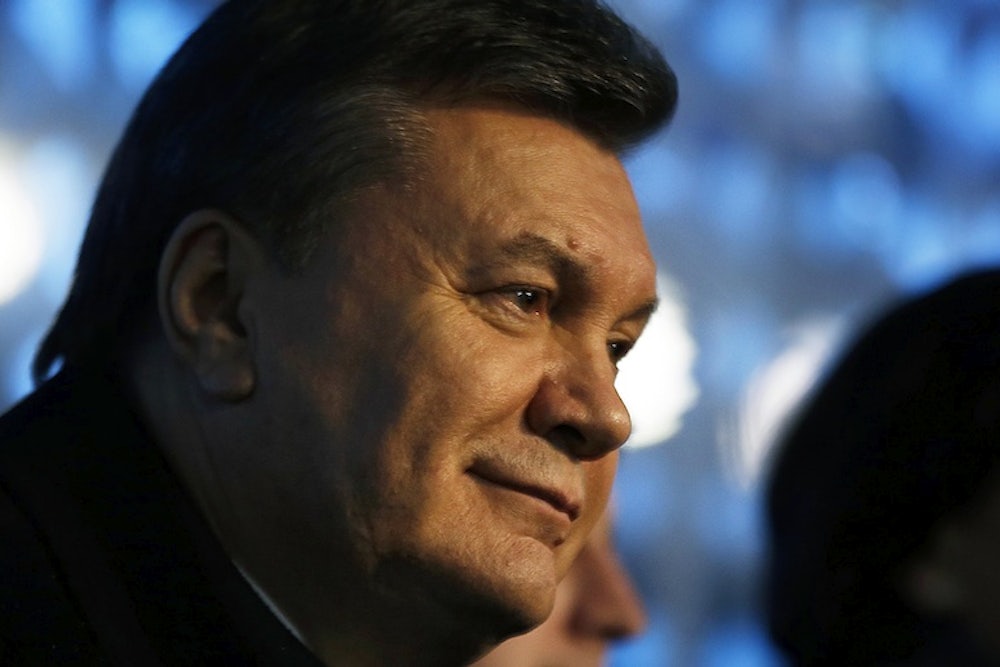As the protests in Ukraine descended into violence earlier this week, a blame game began among foreign leaders. Russia pointed fingers at the protesters for attempting a "coup," and said many western countries "are also to blame." President Barack Obama, meanwhile, said he holds the Ukrainian government "primarily responsible," while also condemning Russia's influence there and in Syria. "You have, in this situation, one country that has clearly been a client state of Russia, another whose government is currently being supported by Russia, where the people obviously have a very different view and vision for their country,” he said. But the notion that the unrest in Ukraine is some titanic battle between East and West for control of Europe’s second-largest country ignores the main reason: the unrest within President Viktor Yanukovych’s government itself, which became even more apparent on Saturday as the Parliament voted to oust him after he fled the capital.
Unlike in Belarus or Russia, where tolerance for mass protests is minimal, Ukraine’s ruling elite is fragmented as to how to combat demonstrations. A group of Ukrainian oligarchs, headed by Yanukovych’s long-term ally and political godfather Rinat Akhmetov, publically supported the association agreement with the European Union that Yanukovych rejected in November (which sparked the EuroMaidan protests). Eager to access lucrative European markets, this group has always warned against the use of force on the protestors for fear of international sanctions and economic isolation. Even more significantly, the oligarchs are wary of closer ties with Russia, fearing absorption by Russia’s own business elite and a loss of their political influence. The oligarchs’ fundamental desire is for political stability and a peaceful end to the protests. Ukraine becoming a political football between Russia and the European Union is simply not good for business. But the emergence of Yanukovych’s "Family" since his election in 2010 has led the country down a much different, more confrontational path.
Taking its name from Boris Yeltsin’s cabal of oligarchs and family members in nineties Russia, Yanukovych’s Family has become a significant ruling force in Ukraine. Comprised of Yanukovych’s son, Oleksandr, a dentist by trade whose wealth is estimated at $510 million, this group brings together long-time Yanukovych allies from Ukraine’s Eastern Donbas region. Vice Prime Minister Serhiy Arbuzov and Head of the Presidential Administration Andreiy Klyuyev have advocated a strong line, using inflammatory rhetoric dismissing the protests. Klyuyev supposedly authorized the enlistment of paid thugs, or "Titushki," to provoke and attack the demonstrators. Their advocacy of violence is driven by the trauma of 2004's Orange Revolution, viewing the failure to overcome the protests nine years ago as a direct result of then-President Leonid Kuchma’s reluctance to use force and push through Yanukovych as president. These groups are motivated to hold onto their position at all cost, fearing the repercussions of losing the zero-sum game they created. It is no surprise, therefore, that the "Berkut" riot police were authorised to use deadly force. The regime’s failure to follow any coherent strategy led to force being the last hand to play.
Recent days have begun to see the unravelling of Yanukovych’s chief kleptocratic tool: His political bloc in the Parliament, the Party of Regions. On Thursday, 34 members of the government sided with the opposition in passing laws aimed at neutering Yanukovych’s power and legitimacy. Thursday’s resignation and defection of the Kiev City Administrator, personally appointed by Yanukovych to run the city after the sacking of the mayor in the early stages of the protests, is symbolic of the growing disunity within the regime. The levels of death and violence in Kiev have clearly shaken the foundations of Yanukovych’s system.
It is with no great surprise, then, that Yanukovych took another U-turn on Friday, striking a deal with three opposition leaders that includes early presidential elections and changing the constitution to reduce presidential powers. The move is indicative of Yanukovych’s handling of the demonstrations in general. From the implementation of the dictatorial anti-protest laws of January 16 to their repeal not even two weeks later to multiple attempts to clear the Maidan to rounds of negotiations and, now, his fleeing the presidential palace while refusing to resign, Yanukovych clearly lacked a cogent plan from the start. Hamstrung by competing interests within the government and desperate to protect his position, he has lurched in one direction and another. Russia’s investment of $15 billion in the Yanukovych regime now seems short sighted.
The explosion of violence in Kiev is the worst seen in Europe this century, and the regime’s choice to allow special forces to use live ammunition against the populace was one of a morally bankrupt government, forced into a corner by its own inept handling of the situation. The complex balance of influence and interests in the Ukrainian government has broken down, leaving force as the remaining option to preserve the regime. The surprising resilience of the protestors, though, forced Yanukovych to concede and then to escape Kiev. That he did all of this against the wishes of Russia, which refused to sign the pact struck on Friday, only further proves that outside influence in Ukraine's unrest has been overplayed. The deaths of scores of citizens and police on the streets of Kiev was not due to some geopolitical struggle being acted out between Russia and the West, but simply a result of the crumbling legitimacy of an intrinsically unstable, corrupt, thuggish government.
